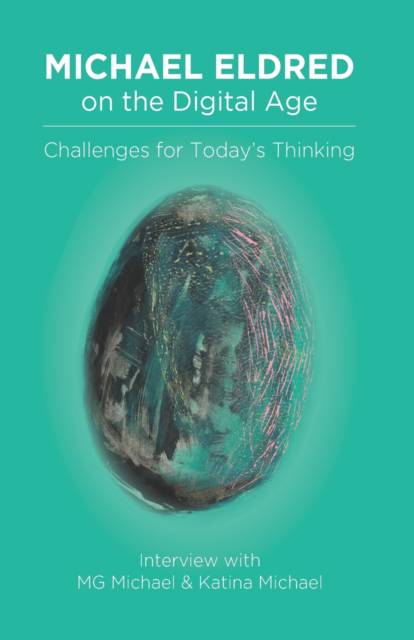
- Retrait gratuit dans votre magasin Club
- 7.000.000 titres dans notre catalogue
- Payer en toute sécurité
- Toujours un magasin près de chez vous
- Retrait gratuit dans votre magasin Club
- 7.000.0000 titres dans notre catalogue
- Payer en toute sécurité
- Toujours un magasin près de chez vous
Michael Eldred on the Digital Age
Challenges for Today's Thinking
Michael Eldred
Livre broché | Anglais
8,45 €
+ 16 points
Description
This little book takes on a series of questions posed by M.G. Michael and Katina Michael. The responses are not conclusive, but rather intended to make the profound challenges presented by the Digital Age visible. These include: How does consciousness differ from psyche? What is the relationship between Artificial Intelligence and the mind? How are visions of transhumanism to be assessed? Why is it important to distinguish between 'what' and 'who'? Who are we to become in the cyberworld? How do the cyberworld and the gainful game of capitalism intermesh? Are ubiquitous surveillance, Überveillance and the loss of privacy inevitable in the Digital Age? Are questions of ethics questions of power?
It is commonplace to say that today we are living in the Digital Age. This period is characterized by the advent of the cyberworld that is populated by bit-strings of data being processed by algorithms. Algorithms themselves are also nothing other than bit-strings composed of binary digits, i.e., zeroes and ones. The result is a third bit-string that triggers an effect either within the cyberworld or outside, in our old, familiar, physical world. The effect could be to send off an e-mail from one electronic server to the digital address of another, a receiving electronic server. Or it could be the command to launch a deadly missile into the sky. The elementary processing unit at the very core of the cyberworld is the Universal Turing Machine that has algorithms copulate with digital data to produce effective offspring. Such a machine does not exist anywhere as a real, physical thing but is 'merely' an idea, a mathematical idea that has turned out to be immensely powerful.
This idea of a cyberworld inhabited by Universal Turing Machines has materialized within a very few decades to make a digital world with which we have to contend every day. For the algorithms now rule our lives. They enable us to do many things, and prevent us just as much from doing other things. Wrongly coded algorithms can wreak havoc in people's lives. Other algorithms enable life-saving surgery to be performed with hitherto unknown precision. So is it just a matter of weighing up the pros and cons of what the cyberworld has to offer us? Or are we challenged to think more deeply about just what this cyberworld is and what is driving it?
Techniques and technologies have been known for millennia all over the world, but the idea of what technology is was interrogated by Greek philosophy. The very conception of what is understood in the West as knowledge is tied to and intimately interwoven with how the Greeks understood technology, the art of making things: A skilful power, the know-how, acts upon material to produce an effect. Technology is effective! This is seemingly a trivial observation hardly worth mentioning. But what seems trivial is the hallmark of philosophical questions that open up abysses for the mind to fathom. What lies hidden behind the idea of effective knowledge is the unbounded will to power over every conceivable kind of movement and change.
Is the cyberworld that is today increasingly encroaching upon and becoming a surrogate for the physical world in countless ways the consummation of this absolute, effective will to power over movement? Are the algorithms the digital encoding of an understanding of one sort of movement that is outsourced from our mind to the cyberworld to produce effects, to steer movements, for better or for worse? Are the algorithms the digitization of our logical understanding in which the logos itself has been encoded as a digital bit-string and now operates autonomously out there in the cyberworld, only seemingly still under our control?
It is commonplace to say that today we are living in the Digital Age. This period is characterized by the advent of the cyberworld that is populated by bit-strings of data being processed by algorithms. Algorithms themselves are also nothing other than bit-strings composed of binary digits, i.e., zeroes and ones. The result is a third bit-string that triggers an effect either within the cyberworld or outside, in our old, familiar, physical world. The effect could be to send off an e-mail from one electronic server to the digital address of another, a receiving electronic server. Or it could be the command to launch a deadly missile into the sky. The elementary processing unit at the very core of the cyberworld is the Universal Turing Machine that has algorithms copulate with digital data to produce effective offspring. Such a machine does not exist anywhere as a real, physical thing but is 'merely' an idea, a mathematical idea that has turned out to be immensely powerful.
This idea of a cyberworld inhabited by Universal Turing Machines has materialized within a very few decades to make a digital world with which we have to contend every day. For the algorithms now rule our lives. They enable us to do many things, and prevent us just as much from doing other things. Wrongly coded algorithms can wreak havoc in people's lives. Other algorithms enable life-saving surgery to be performed with hitherto unknown precision. So is it just a matter of weighing up the pros and cons of what the cyberworld has to offer us? Or are we challenged to think more deeply about just what this cyberworld is and what is driving it?
Techniques and technologies have been known for millennia all over the world, but the idea of what technology is was interrogated by Greek philosophy. The very conception of what is understood in the West as knowledge is tied to and intimately interwoven with how the Greeks understood technology, the art of making things: A skilful power, the know-how, acts upon material to produce an effect. Technology is effective! This is seemingly a trivial observation hardly worth mentioning. But what seems trivial is the hallmark of philosophical questions that open up abysses for the mind to fathom. What lies hidden behind the idea of effective knowledge is the unbounded will to power over every conceivable kind of movement and change.
Is the cyberworld that is today increasingly encroaching upon and becoming a surrogate for the physical world in countless ways the consummation of this absolute, effective will to power over movement? Are the algorithms the digital encoding of an understanding of one sort of movement that is outsourced from our mind to the cyberworld to produce effects, to steer movements, for better or for worse? Are the algorithms the digitization of our logical understanding in which the logos itself has been encoded as a digital bit-string and now operates autonomously out there in the cyberworld, only seemingly still under our control?
Spécifications
Parties prenantes
- Auteur(s) :
- Editeur:
Contenu
- Nombre de pages :
- 86
- Langue:
- Anglais
Caractéristiques
- EAN:
- 9781741283389
- Date de parution :
- 20-08-21
- Format:
- Livre broché
- Format numérique:
- Trade paperback (VS)
- Dimensions :
- 140 mm x 216 mm
- Poids :
- 108 g

Les avis
Nous publions uniquement les avis qui respectent les conditions requises. Consultez nos conditions pour les avis.






